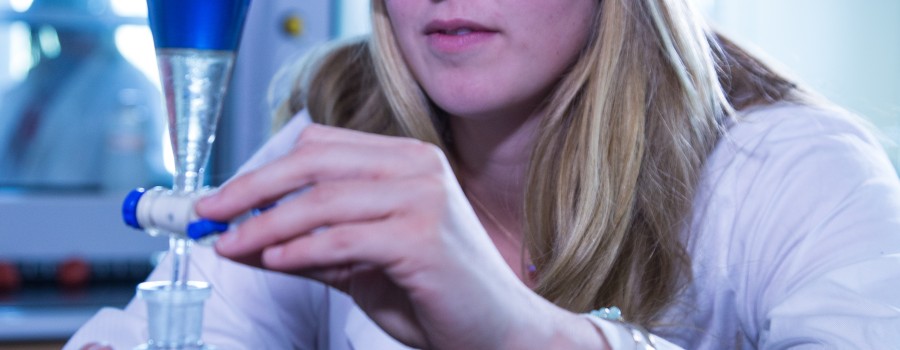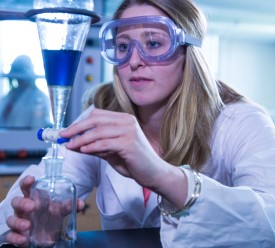The chemical mysteries of the universe, right at your fingertips.
Explore the things that matter, interact with those who share your passion, and be challenged by knowledgeable teachers who put you first. It all starts with a bachelor’s degree in chemistry from University of the Cumberlands. Endless career opportunities open for you post-graduation when you major in chemistry, all certain to lead to success and a fulfilling professional life. From continuing your research as a chemist to passing on your knowledge to the next generation as teacher, a degree in chemistry ensures that you will make an impact on the world like no one else can. With high-end laboratories, a close-knit faculty, and small class sizes, your educational experience will be personal and tailored to your goals and interests - whether that's organic chemistry, physical chemistry or another aspect of this scientific discipline. You want to succeed, and Cumberlands wants to help. The time has come for you to use your chemistry skills to make the world a better place! Are you ready?
By the Numbers
$79,760
6%
1 in 5
96%
Programs & Requirements
* The credit hours listed on this page only reference the specific program requirements and is not reflective of the total hours necessary to receive your degree. Cumberlands requires all students obtain a minimum of 60 hours for an associate’s degree and a total of 120 hours for a bachelor’s degree. Transfer and prior learning credits may be counted toward those totals.
To learn more about our General Education Requirements, please visit the page referenced below or explore our Academic Catalog.
Bachelor of Science in Chemistry
This bachelor's degree in chemistry is your chance to focus on becoming a better chemist and exceptional student. As a chemistry degree major at Cumberlands, you will spend your time between the lab and the classroom, where you will personalize your learning experience and explore the scientific subject you love. Uncover the power of chemistry and what it means for the world, then use your new knowledge and skills to make an impact in a way only you can!
Course Requirements
36 Credit Option- This option is recommended for students planning to attend graduate school in chemistry or those going directly into employment as an industrial chemist. Students choosing this option are strongly encouraged to take other advanced courses, especially CHEM 436 - Instrumental Analysis. Other Selected Topics courses include BIOL 346 - Biochemistry, and special topics such as those listed in the course description of CHEM 491.
- CHEM 132 - General College Chemistry I
- CHEM 111 - General Chemistry Laboratory I
- CHEM 232 - General College Chemistry II
- CHEM 211 - General Chemistry Laboratory II
- CHEM 331 - Organic Chemistry I
- CHEM 321 - Organic Chemistry Laboratory I
- CHEM 332 - Organic Chemistry II
- CHEM 322 - Organic Chemistry Laboratory II
- CHEM 336 - Analytical Chemistry
- CHEM 328 - Analytical Chemistry Laboratory
- CHEM 441 - Physical Chemistry I with Laboratory
- CHEM 434 - Inorganic Chemistry
- CHEM 490 - Senior Research Project
- CHEM 432 - Physical Chemistry II
- CHEM 412 - Physical Chemistry Laboratory II
35 Credit Option- This option is recommended for students entering a “blended” area such as pre-professional medically related areas (medicine, dentistry, pharmacy, physician assistant, physical therapist, etc.), chemistry/business, and chemistry/biology
- CHEM 132 - General College Chemistry I
- CHEM 111 - General Chemistry Laboratory I
- CHEM 232 - General College Chemistry II
- CHEM 211 - General Chemistry Laboratory II
- CHEM 331 - Organic Chemistry I
- CHEM 321 - Organic Chemistry Laboratory I
- CHEM 332 - Organic Chemistry II
- CHEM 322 - Organic Chemistry Laboratory II
- CHEM 336 - Analytical Chemistry
- CHEM 328 - Analytical Chemistry Laboratory
- CHEM 441 - Physical Chemistry I with Laboratory
- CHEM 434 - Inorganic Chemistry
- CHEM 490 - Senior Research Project
- CHEM 491 - Selected Topics in Chemistry OR BIOL 346 - Biochemistry
- CHEM 132 - General College Chemistry I
- CHEM 111 - General Chemistry Laboratory I
- CHEM 232 - General College Chemistry II
- CHEM 211 - General Chemistry Laboratory II
- CHEM 331 - Organic Chemistry I
- CHEM 321 - Organic Chemistry Laboratory I
- CHEM 332 - Organic Chemistry II
- CHEM 322 - Organic Chemistry Laboratory II
- CHEM 336 - Analytical Chemistry
- CHEM 328 - Analytical Chemistry Laboratory
- CHEM 441 - Physical Chemistry I with Laboratory
- CHEM 413 - Teaching Practicum in Chemistry
- CHEM 434 - Inorganic Chemistry
- CHEM 490 - Senior Research Project
- CHEM 491 - Selected Topics in Chemistry OR BIOL 346 - Biochemistry
Notes:
Additional 42 hours of professional education courses required for secondary education Students are encouraged to take other advanced courses, such as:
CHEM 432 - Physical Chemistry II and CHEM 412 - Physical Chemistry Laboratory II.
CHEM 491 requirement may be replaced with CHEM 436 - Instrumental Analysis
A Bachelor of Arts requires all the same courses as a Bachelor of Science with the addition of four classes (12 hours) in a foreign language.
Choose one foreign language sequence:
- FREN 131 Elementary French I
- FREN 132 Elementary French II
- FREN 231 Intermediate French I
- FREN 232 Intermediate French II
- SPAN 131 Elementary Spanish I
- SPAN 132 Elementary Spanish II
- SPAN 231 Intermediate Spanish I
- SPAN 232 Intermediate Spanish II
Minor in Chemistry
Fuel your passion for science by minoring in chemistry. You can spend time in the laboratory and chemistry classes while pursuing a different major. In other words, you get the best of both worlds! Supplement your bachelor's degree with a useful minor that will make you more marketable to future employers.
Course Requirements
- CHEM 132 - General College Chemistry I
- CHEM 111 - General Chemistry Laboratory I
- CHEM 232 - General College Chemistry II
- CHEM 211 - General Chemistry Laboratory II
- CHEM 331 - Organic Chemistry I
- CHEM 321 - Organic Chemistry Laboratory I
- CHEM 332 - Organic Chemistry II
- CHEM 322 - Organic Chemistry Laboratory II
- CHEM 336 - Analytical Chemistry
- CHEM 328 - Analytical Chemistry Laboratory
Take the Next Step
Mission & Goals
The purpose of the Chemistry Department is to provide a challenging curriculum in a nurturing environment, teaching students chemistry theory and laboratory skills that enhance their critical thinking and communicative skills.
Chemistry Careers & Outcomes
All stats from U.S. Bureau of Labor Statistics
Chemist: $79,760
Chemist: $79,760
Description: Chemists research and analyze the chemical properties of substances to develop new materials, products, or knowledge.
Chemistry Teacher: $62,820
Chemistry Teacher: $62,820
Description: Chemistry teachers teach classes about various topics within chemistry and related fields.
Natural Sciences Manager: $137,900
Natural Sciences Manager: $137,900
Natural sciences managers supervise other scientists. This can include other chemists, physicists, and biologists. They can vary between being in the laboratory and in an office environment.
Chemical Researcher: $79,760
Chemical Researcher: $79,760
Chemical researchers spend time researching the elements and chemical materials and properties. They lead the way for research into new and innovative chemical solutions.
Laboratory Manager: $137,900
Laboratory Manager: $137,900
Laboratory managers manage other laboratory scientists within a project.
Pharmacist: $128,570
Pharmacist: $128,570
Pharmacists dispense prescription medications and provide information to patients about the drugs and their use. Successful completion of a pharmacy graduate program is required to become a licensed pharmacist.
Common Questions
A chemistry degree provides an in-depth study of the substances that make up our world, including their composition, structure, and properties. It involves exploring how different substances interact and react with each other, and applying this knowledge to solve problems and develop new materials.
Typically, a bachelor's degree in chemistry takes about four years of full-time study to complete. This duration may vary depending on the specific program and whether the student is enrolled part-time or full-time.
Yes, it is possible to obtain a chemistry degree online. Many institutions offer online programs for chemistry degrees, which include virtual labs and coursework that cover the same material as traditional on-campus programs.
Whether a chemistry degree is worth it depends on your career goals and interests. A chemistry degree can open doors to various professional opportunities, including roles in research, teaching, and industry. It is especially valuable if you have a passion for science and a desire to work in a field that requires a strong understanding of chemical principles.
With a chemistry degree, you can pursue various career paths such as becoming a chemist, chemistry teacher, natural sciences manager, chemical researcher, laboratory manager, or pharmacist. Each of these roles involves applying your knowledge of chemistry in different ways, from conducting research to managing scientific teams.
To obtain a chemistry degree, you need to enroll in an accredited program at a college or university. You will complete required coursework in areas such as analytical, inorganic, organic, and physical chemistry, as well as gain practical laboratory experience.
Chemistry is the scientific study of the properties, composition, and behavior of matter. It involves understanding how substances interact, combine, and change through various chemical reactions and processes.
Chemistry can be challenging, as it requires a strong grasp of complex concepts and mathematical calculations. However, with dedication and effective study strategies, students can successfully navigate the difficulties and gain a thorough understanding of the subject.
A bachelor’s degree in chemistry is typically called a Bachelor of Science in Chemistry (BS in Chemistry). This degree provides comprehensive training in chemical principles and laboratory techniques.
Faculty Experts in Chemistry
Get to know your future professors in chemistry before even setting foot on campus!

Jeffrey Schwarz
Jeffrey Schwarz
Contact Information

Dr. Julie Tan
Dr. Julie Tan
Contact Information

Dr. Amber Randolph
Request Information
You have questions? We have answers. Ask away, and we'll get back to you soon!

